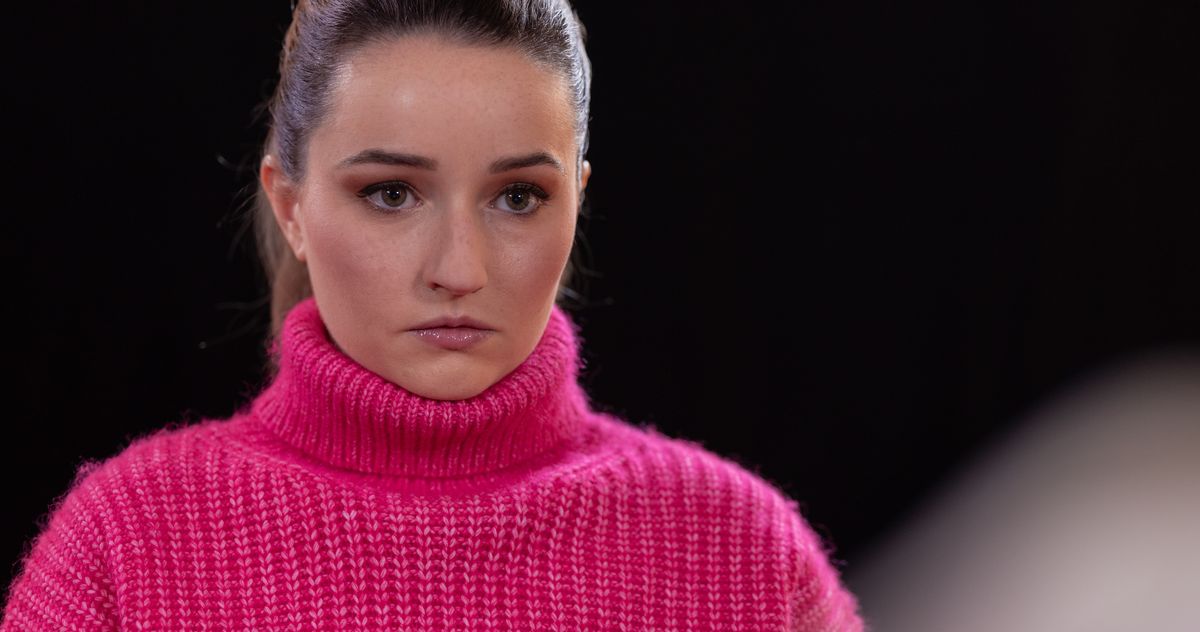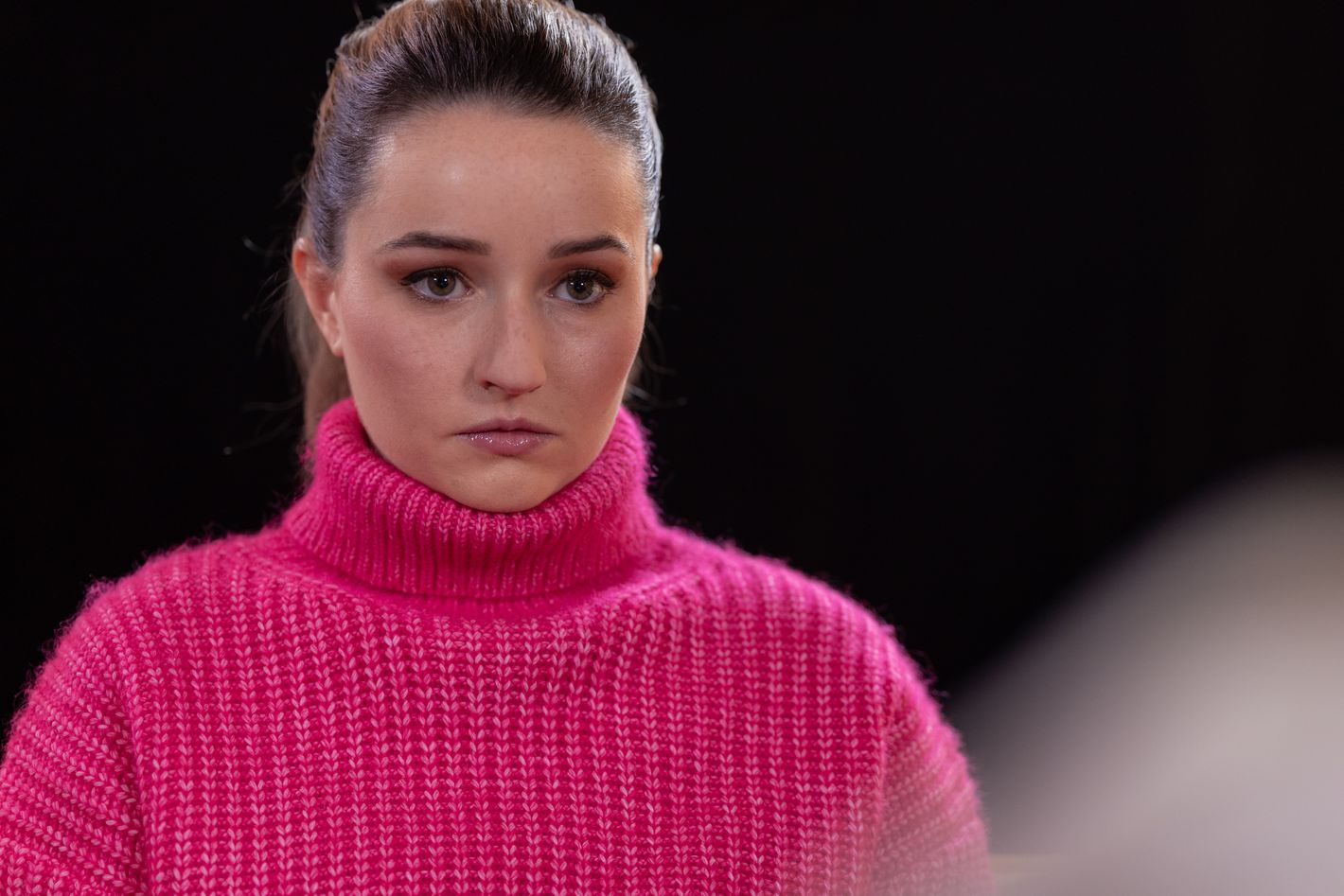You’ve Seen This One Before
Apple Cider Vinegar plumbs a new low for TV scammers.


A charismatic young person quickly rises to prominence, making a lot of money in the process, with the help of a compelling underdog story and a new take on conventional wisdom. Maybe they’re a start-up founder, like Elizabeth Holmes, or a supposed heiress with plans for real-estate deals but a personal fortune just out of reach, like Anna Delvey. You’ve seen a scammer like this on TV before, especially if you’ve subscribed to any streaming service in the past few years. They’re usually played by a rising or established star on the hunt for awards recognition; their story has already been run through the media mill of podcasts and book deals till it’s basically grist; and with only a few exceptions — The Dropout really was quite insightful — the observations remain in the shallow end of the pool. So, here’s a recipe for you: Take all the existing ingredients of this genre, boil until you’ve extracted most of the nutrients, serve a few years too late to satisfy the hunger for this specific trend, and you’ve made Apple Cider Vinegar.
The latest Netflix scammer series, dubbed a “trueish story based on a lie,” dramatizes the life and lives of Belle Gibson, an Australian influencer with terminal brain cancer who shilled recipes through a wellness app positioned as an alternative to traditional medicine. The twist, as the show reveals at the beginning of the first episode, is that Gibson didn’t have cancer — and, of course, that you can’t cure a disease just by changing your diet. There’s a lot here that, treated thoughtfully, could make for a compelling story. The fact that Gibson was able to lie about something so extreme for so long, and get to the point where she was the subject of fawning magazine articles and making deals with Apple to be part of the launch of the Apple Watch, points to the ways in which people are inclined to doubt the medical Establishment and give undue credence to “free thinkers,” especially if they come to us in the form of glamorous white women. But it’s a story that has, also, been told several times over, especially in Australia, where Gibson was at the center of a media circus around 2015, including an infamous television interview the show meticulously re-creates down to the turtleneck. She’s also been the subject of a detailed biography, written by the journalists who uncovered her deceptions, which serves as the basis for Apple Cider Vinegar as well as any number of other articles and documentaries. (I recommend the episode of Maintenance Phase on the subject, if you’d like an incisive analysis of the media environment that allows someone like Gibson to thrive, which also has the advantage of dispatching with her story in less than an hour.)
Ten years on, what does a Netflix series add to our understanding of Gibson’s lies? Not much, aside from rehashing the facts of the case in a lurid yet scattershot manner that has become typical of the shows that air on the streaming service. First off, there’s a fundamental structural issue: The series, written by Nine Perfect Strangers’ Samantha Strauss, with Anya Beyersdorf and Angela Betzien, skips around in time as it tries to tell Gibson’s story from multiple perspectives. We see a version of events as told by Gibson herself, played with defiance and a deeply convincing (at least to an American ear) Australian accent by Kaitlyn Dever, as she tries to defend herself with the help of expensive crisis PR. But then we also see versions of events through the prism of Milla, a rival wellness influencer played by Alycia Debnam-Carey, who really does have cancer but who has convinced herself, and by extension her followers, to only pursue unscientific treatments. (The character is fictional, a seeming composite of other women of Gibson’s era.) We also hear from Milla’s friend Chanelle, played by The Bold Type’s Aisha Dee, providing our one American accent and who really deserves to be in a less thankless project. She falls into Belle’s orbit but eventually takes her story to the media. (A real woman named Chanelle McAuliffe did so in real life.) Mark Coles Smith plays our heroic strong-jawed journalist, who relentlessly pursues the story while his own partner undergoes cancer treatments of her own — Apple Cider Vinegar uses this as an opportunity to, falteringly, explore the appeal of alternative therapies. Finally, The Lost Symbol’s Ashley Zukerman plays Belle’s husband, a man who comes across as long-suffering, willfully ignorant, and, frankly, a total dope.
The fact that Apple Cider Vinegar tries to be a television show with nearly a half-dozen protagonists creates a kind of narrative pileup. It’s possible to build a coherent whole from contradictory perspectives, especially through focusing on unifying themes, but Apple Cider Vinegar swerves between its narrative lanes haphazardly and unsubtly. Details of the characters’ psychologies — Belle’s impulse to fake an ailment whenever she’s threatened, or Milla’s doubling down on pseudoscience to protect herself from facing mortality — are introduced, underlined, and then hammered over repeatedly.
The structural flaws here are, like the choice of subject, all too familiar in streaming television. The dialogue favors over-explanation, as if designed to be understood by someone who is also paying attention to another screen. The cinematography is overlit and oversaturated, in keeping with the standard of Netflix gem-toned slush that makes every TV show look like it was dispensed out of an Icee machine. And the performances are turned up to the level of high intensity without much emotional headway. In other projects, like the harrowing true-crime drama Unbelievable (a high-water mark for Netflix) or even amid the high jinks of Booksmart, Dever has shown herself to be a gifted and recessive actress, able to draw an audience in with a sort of quiet focus. It’s the kind of unadorned naturalism that made her, by far, the best aspect of the film version of Dear Evan Hansen, where she played a grieving sister and love interest in another project oddly about someone lying online for sympathy. In Apple Cider Vinegar, Dever is still watchable, but she’s only got artifice to work with, a blank slate onto which you can project drama as school-level-technical showboating. Look, an accent! Look, a tendency to break down into hysterics! This is not as much an acting showcase as a gymnastics routine.
There’s a similarly attention-grabbing yet superficial quality to Apple Cider Vinegar’s treatment of wellness culture itself. The show gestures toward critiques that are familiar but underdeveloped. Sure, it’s true that doctors can be insensitively brusque, and that scams about “alternative” medicine thrive through their ability to promise a less painful, more human-scale approach. But there’s little here that justifies spending six long episodes with a pathological liar or convinces you that the show has anything new to say about social media. Gibson’s rise was inextricably linked to the popularization of Instagram. Apple Cider Vinegar depicts the experience of posting online through a recurring motif of emojis flowing out of a phone or laptop across the screen. Belle, in this telling, cares more about those little cartoon faces than the actual people she’s claiming to help cure. But maybe the series does, too.
As Apple Cider Vinegar approaches its conclusion, we get a set piece built around the publication of a takedown article about Belle in which the journalists obsessively reread the comments section, hoping the tide will turn against their subject. This is framed as a heroic moment — Smith’s character’s wife, who defends Belle earlier in the series, decides to join the comments and post something attacking her — but it comes across as a shrinking vision of what journalism like this hopes to accomplish. Here, if unintentionally, is the show’s most cutting satire. Have we been conditioned only to uncover these scammers for the sake of the adulation of faceless commenters? Are we all dancing our little dance for those emojis too? The series contains an attempt to counteract your queasy concern that, in telling this story again, we’re just giving a scammer like Belle Gibson more of the attention she wants. At the beginning of every episode, an actor recites a recap to the camera and then adds a note that Belle Gibson has not been paid for the rights to the story. But isn’t putting her back in the spotlight payment enough?








